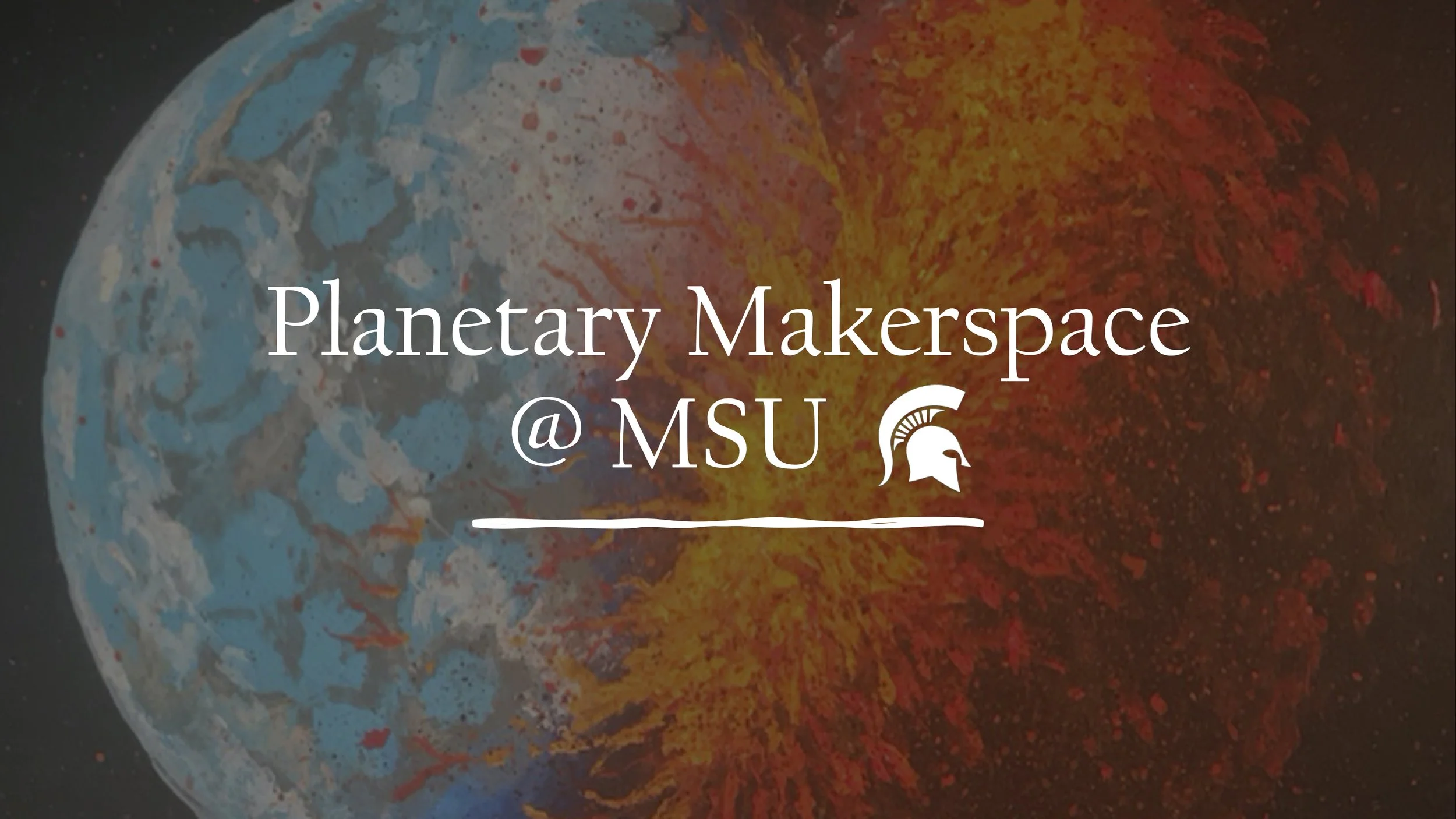Planetary Makerspace @ MSU Mentoring Philosophy
The Planetary Makerspace group led by PI Seth Jacobson at MSU uses a goal-based mentorship approach that centers our work on common goals between mentor and mentee. These goals are not static and often temporal, and so we routinely update and evaluate them. Goals may include specific skills or knowledge we want to obtain, but goals also likely include professional milestones and timelines. After we establish our goals, we decide on a path made up of a number of objectives such as taking certain courses, mastering specific tools, and completing research projects. Of course, these are made up of daily tasks and activities that will then support us achieving our goals. We meet Monday, Wednesday, and Friday during 15-minute group scrums to share our successfully completed tasks and activities, our obstacles and concerns, and make SMART short-term goals that establish the tasks and activities needed to be accomplished for the next scrum. We also use scrums to dynamically schedule longer mentor-mentee meetings and peer-to-peer meetings as needed to accomplish our goals. On longer timescales (typically every term), we not only reassess our tasks and activities, but we also reassess our overall goals. Through these regular meetings, information passes both up to the mentor and down to the mentee, and we are immediately using this information in our decision-making processes.
The everyday routine of the Planetary Makerspace balances the independence and freedom of academic research with mentor oversight of progress and productivity. We've found that by using a goal-based mentorship approach that each of us understands what we're doing and why we're doing it. Thus, we stay motivated and focused on achieving the overlying goals. Since every meeting includes an opportunity to reflect on the process, we maintain an open line of communication and can also provide rapid feedback to one another. This feedback is essential for supporting one another and determining if each of our needs are being met. If not, then new goals can be set to directly support those needs.
One mentorship goal of the Planetary Makerspace PI Seth Jacobson is to equip each mentee with the skills of a goal-based leadership approach, so that ultimately, they can independently set and achieve academic goals. We accomplish this by sharing in the setting of goals, objectives, and tasks rather than dictating them from a leadership position. Mentees are then empowered to participate and learn a process with which they can lead in the future.
Requesting Letters of Recommendation
I’m generally eager to provide letters of reference for students that have done well in my courses, assisting me with teaching, or in their research projects within the Planetary Makerspace. If I accept the responsibility of writing a letter of recommendation, it will be a recommendation—in other words, I only write letters that provide strong positive support because I will decline to write a recommendation otherwise. My letters will highlight accomplishments, identify strengths, describe witnessed growth, note areas for improvement, and endorse you as a candidate for the position. In order to write a strong recommendation letter, I make the following requirements to be completed when you make the initial letter request:
I require at least two weeks notice by email before the letter’s due date. More advance notice is better. If I have written a letter for you within the last year, then shorter notice is possible but you should give me as much notice as possible. This notice should include not just when the letter should be submitted but to whom it should be addressed and how it should be submitted: email, website, etc.
I will write a better letter if I have more information about you, why I am sending the letter, to whom I am sending it, and what other information you are submitting. Thus, please send me copies of your up-to-date unofficial MSU transcript, your CV/resumé, cover letter, and other submission documents when you request the letter. If you are still working on your application, it’s better to send me partial/incomplete documents than no documents. Also consider writing me a very explicit guide of how I can best argue your case (see here for description of how to do this).
Since FERPA protects your academic privacy, I cannot share information about your performance in MSU classes (or even confirmation that you took those class) without your permission. On the MSU webpage you can find a FERPA release form, and I require that you fill out this release form for each requested letter. In order to maintain integrity in the recommendation letter process, I ask that you circle that you waive the right to review a copy of the letter and that regarding the information that may be disclosed you write, “Any information from my educational records as Prof. Seth Jacobson believes relevant to the letter such as course enrollment, course grades, and GPA.” For your convenience, I provide an acceptable version of the form to complete: Planetary Makerspace FERPA release form.
Planetary Makerspace @ MSU Policy Documents
Strategic Planning
Undergraduate student research assistant Policies
Travel Policies
legal releases
Planetary Makerspace @ MSU Useful Links
Preparing poster presentations
Poster Presentation Advice by MSU Undergraduate Research Office — includes examples as well as advice
An MSU student, Mike Morrison, created the #BetterPoster template — this template is getting very popular especially in meetings with large, crowded poster halls. Here are two youtube videos he made advocating for #BetterPoster: https://youtu.be/n_21Ae6BPJc and https://youtu.be/SYk29tnxASs
Better Posters by Zen Faulkes — an entire blog about poster design that’s turned into a book
How to Create a Research Poster from NYU Libraries — includes lots of advice
Presentations: Billboard Science by Kendall Powell in Nature
Epic Fail: What a Perfectly Putrid Poster Can Do for You by P. Cooper and J. Galkiewicz — Tips to avoid!
